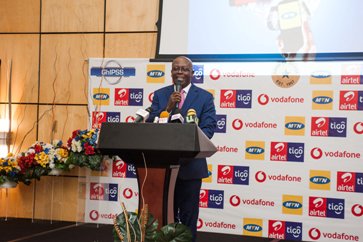 There is an increasing shift away from the use of cheques to electronic payments channels for various transactions. Although cheques continue to have the single largest share, it is growing at a slower pace while other electronic payments are experiencing a faster growth in patronage. This is demonstrated in the half year summary performance of GhIPSS product.
There is an increasing shift away from the use of cheques to electronic payments channels for various transactions. Although cheques continue to have the single largest share, it is growing at a slower pace while other electronic payments are experiencing a faster growth in patronage. This is demonstrated in the half year summary performance of GhIPSS product.
The dominance of cheques begun to reduce following the introduction of electronic payment products. In the first half of 2016, it accounted for 39 percent of products and services offered through the Ghana Interbank Payment and Settlement System (GhIPSS) platform.
Its percentage share dropped further to 30 percent in the first half of this year. e-zwich transactions are running neck to neck with cheques, accounting for 29 percent of transactions for the first half of this year, followed closely by ACH Direct Credit which accounted for 26 percent of the transactions.
The other services with smaller contributions include gh-link, Direct Debit, GIP and latest entrant, mobile money interoperability, which are all chipping away the shares of cheques.
Archie Hesse, Chief Executive of Ghana Interbank Payment and Settlement Systems (GhIPSS), noted that the trend is a strong indication that people are adopting digital payment platforms for payment. He added that the introduction of mobile money interoperability in just two months have taken 3% of total transaction volume of 2018 half year.
Cheques are increasingly being considered as less efficient as it involves physically going to the banking hall when the same transaction could be performed faster using other channels without visiting a banking hall. Some banks have therefore started introducing measures to discourage the use of cheques for smaller transactions, in order to encourage the public to go for channels such as ACH, GIP, e-bils pay or mobile money among others.
Mr. Hesse said the patronage for ACH Direct credit which allows for electronic interbank transfers was enjoying a steady rise, as many institutions and individuals continue to find it a better alternative.
Mr. Hesse encouraged organisations not to restrict formal payment to cheques only but to open up and accept other channels as equally formal ways of making and receiving payments. He explained that the various electronic channels have audit trails and other details that could be recorded in their books for accounting purposes.
“Times have changed and there are quicker, faster and more secure ways of making formal payments and our organisations must move with the times and accept these new channels as formal payments as well” he emphasised.
Mr. Hesse said GhIPSS together with the banks will continue to educate and assist organisations to set up their accounting system to recognize these various electronic payments.
